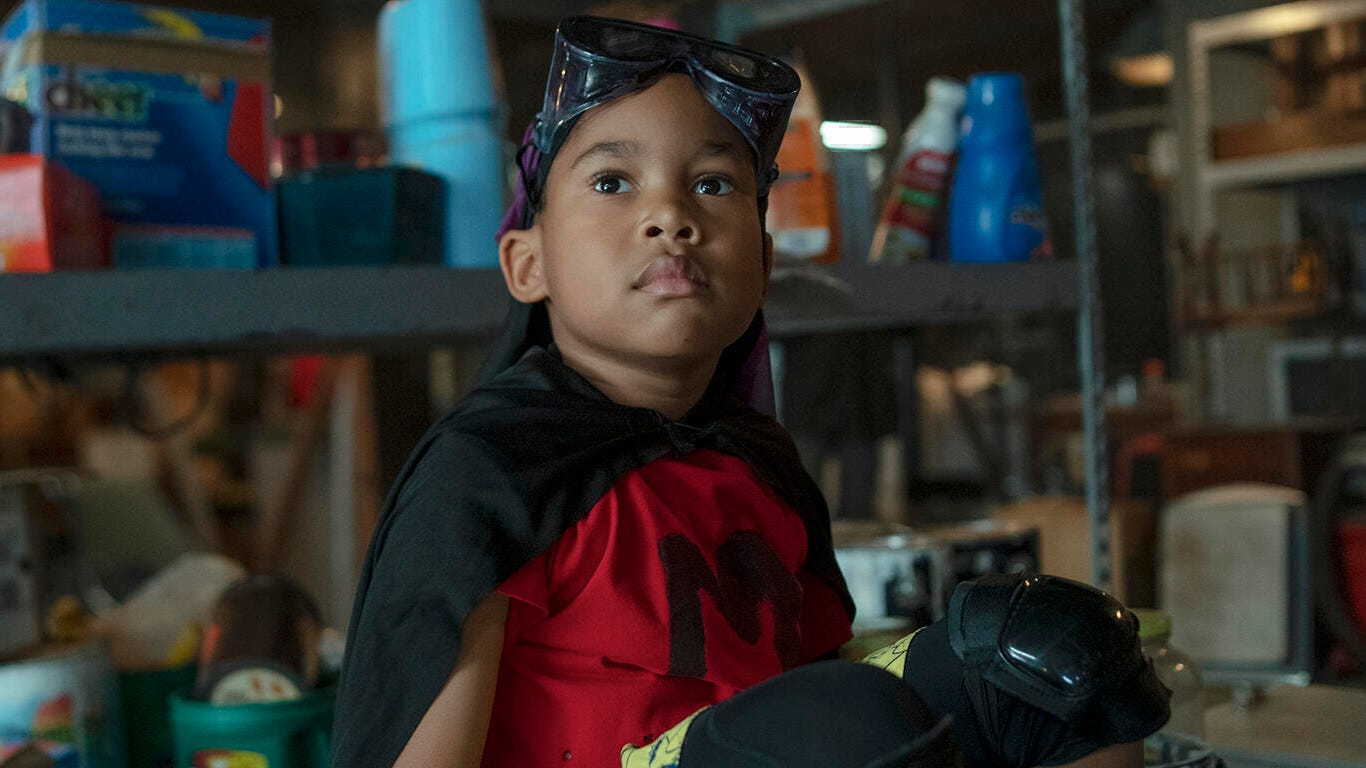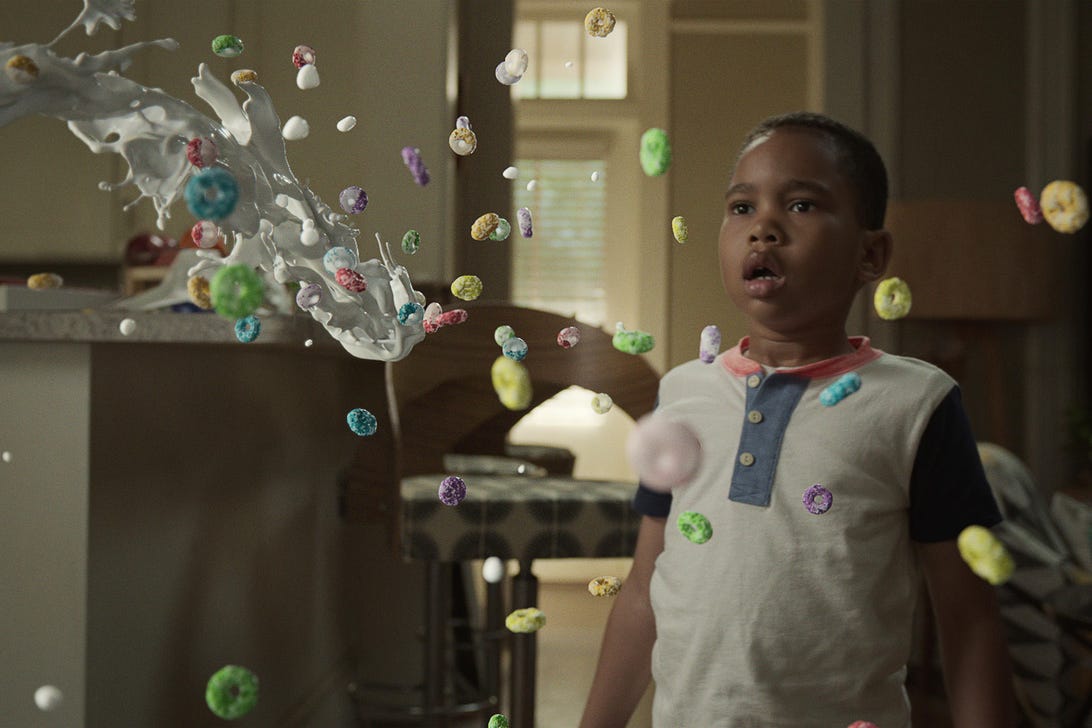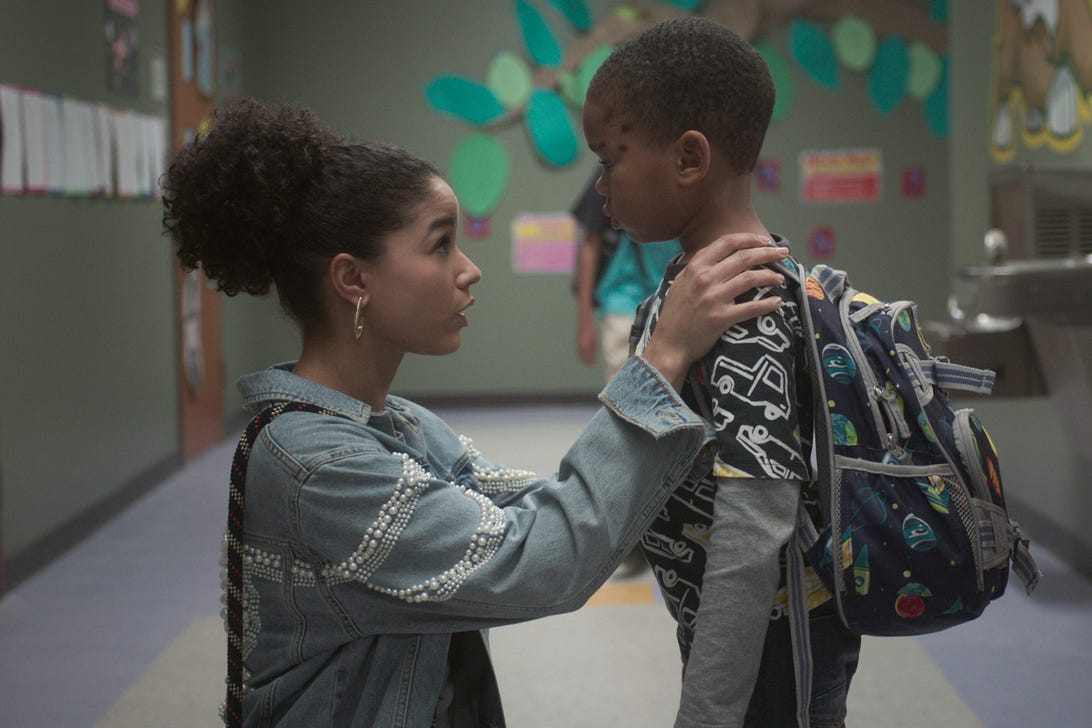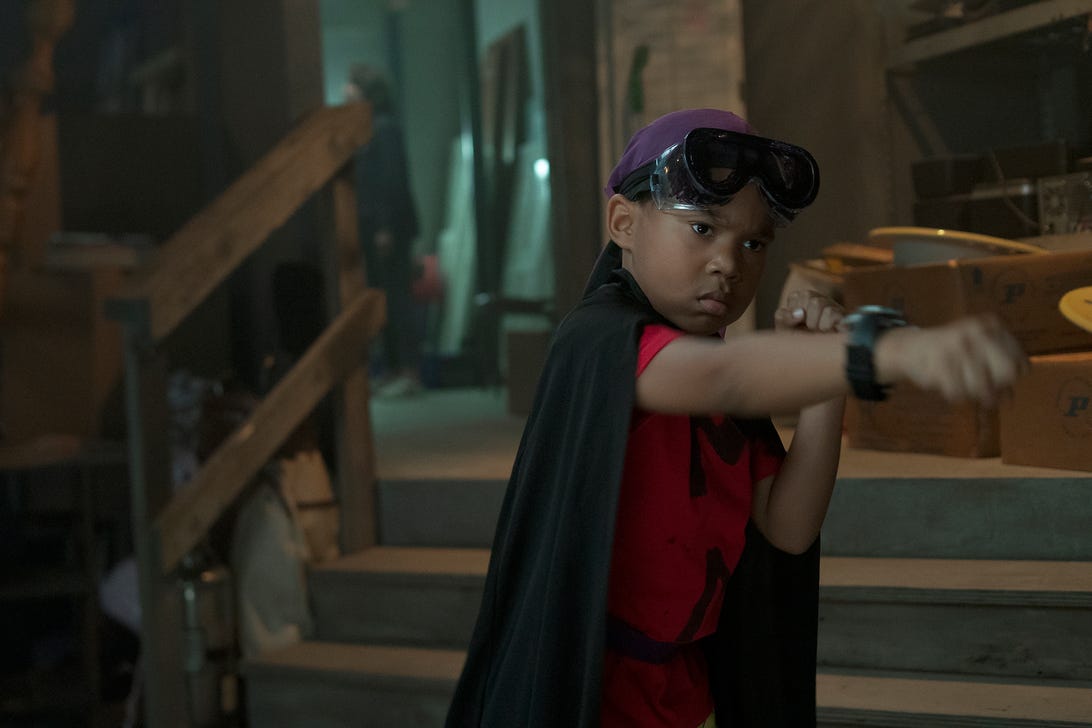
'He's Brown Like Me': Netflix's Raising Dion Lets Kids of Color See Themselves as Superheroes
How the family drama empowers kids to overcome real-life obstacles

Note: This feature originally ran in February 2020 for Black History Month. Amid the ongoing civil unrest around the country, TV Guide is re-publishing this story and others like it to help foster greater understanding and awareness around issues of racial justice. Black lives matter. Text DEMANDS to 55156 to sign Color of Change's petition to reform policing, and visit blacklivesmatter.carrd.co for more ways to donate, sign petitions, and protest safely.
Jayan Bouknight has seen just about every superhero show and movie there is. The 10-year-old Bostonian likes Superman because he can fly, and he idolizes Thor because he can throw his magic hammer. But when the inquisitive fourth-grader turned on Netflix to find something to watch late last year, the streaming service offered him a new kind of superhero to admire -- one who looked, talked, and acted like him. The series, Raising Dion, tells the story of a young black boy born with superhuman abilities, and Jayan was hooked from the moment he saw its thumbnail on his search screen.
"I like that he's brown like me," said Jayan, who is half black and half Indian. He convinced his twin brother, Aman, to watch, and now they're both obsessed. "His mom freaks out like my mom, and he plays with Legos like I do," Jayan said. "I saw what kind of powers Dion has, and I loved it, and I binged every episode in, like, two days. I would've binged it in one day, but I couldn't because of my bedtime."
The Rise of Black Superheroes: A Black History Month Celebration
Based on Dennis Liu's comic books and movie short of the same name, Raising Dion was adapted by Carol Barbee for Netflix, where it premiered in October and went on to become the 10th most popular series of 2019, according to the streamer's rankings. The family drama follows a devoted mother named Nicole (Alisha Wainwright) as she struggles to keep a job and rear her precocious 8-year-old son, Dion (Ja'Siah Young), after the death of her husband, Mark (Michael B. Jordan, who is also an executive producer). Nicole's parenting duties become more intense when she discovers that Dion can suspend himself and objects in midair, go fishing without a pole by making the fish levitate, and defend himself against bullies by throwing them around with his mind.
The show is part of a cultural shift within the world of superhero entertainment. Decades after white superheroes swooped onto screens, Hollywood portrayals of black and brown superheroes are finally proliferating, and the companies creating these films and shows are reaping the benefits. Black Pantherwas a massive box office draw in 2018, raking in $1.3 billion. Spider-Man: Into the Spider-Verse, which featured a black and Puerto Rican version of Spidey named Miles Morales, grossed $375.5 million and won the Oscar for Best Animated Feature. And HBO's comic-inspired Watchmen, which starred Oscar-winner Regina King as a masked vigilante, was the network's biggest new draw in nearly three years, racking up an impressive 7 million viewers per episode.

Ja'Siah Young, Raising Dion
NetflixMeanwhile, diverse superhero shows aimed at kids are finally becoming more commonplace -- with the likes of Netflix's Raising Dion, Cartoon Network's Steven Universe and Teen Titans Go!, and Disney Channel's forthcoming Moon Girl and Devil Dinosaur -- and tapping into an audience that historically has been underserved. For the first time, children of color are able to see on-screen superheroes who look like them.
Raising Dion takes this representation a step further, creating a character who has to face a challenge his white predecessors never did -- and one that might hit close to home for some of the show's young viewers and their parents.
Don Cheadle, David Ramsey, and More Stars Reflect on Their Black Superhero Roles
In the show's third episode, which is arguably its strongest installment, a white teacher assumes Dion is at fault for a fight; in actuality, a white boy in Dion's class took a watch that had belonged to Dion's late father. Fortunately, a sympathetic black science teacher steps in to prevent Dion from getting suspended. Like all too many black parents, Dion's mom realizes that it's time to have "the racism talk" with her child.
"Sometimes, other people, they're going to be afraid of you," Nicole tells Dion in the episode.
"Because I have powers?" Dion asks.
"No, this isn't about powers," she says. "This is about people treating you differently because of the color of your skin."
"I thought Dr. King fixed that," Dion says.
"He fixed some of it," Nicole replies.
When Los Angeles mom Sylvia Wilson watched the racist teacher scene with her kids, it took a moment for her 8-year-olds, Spencer and Alaina, to figure out what was going on, she said. "The kids asked why the teacher was so mean to Dion and so kind to the bully kid," said Wilson, adding that she and her husband, who both are black, have talked about racism with their children in the past. "I turned the question back to them and asked them why they thought that might be, and I asked them how is Dion different from the other boy. First, they said he has superpowers. But then they said, 'He's black, and the teacher was mean because he thought all black people are bad.' After that, they got sad and quiet at the thought."

Alisha Wainwright and Ja'Siah Young, Raising Dion
NetflixWilson said the fact that her kids -- and Dion -- didn't immediately think the teacher was racist is a type of progress in itself. "I picked up the teacher's vibe immediately since I grew up going to predominantly white schools," she said. "I knew as soon as he opened the door that Dion would be the focus of his wrath. Dion had an ally in his science teacher, a barrier to the biased and punitive reaction. I didn't have allies to stand between me and blatant racism."
She added that the show served as a good model for how to discuss racism with children. "I loved how his mom explained racism to him, first building him up to lessen the blow of how the world is ready to knock him down based on the color of his skin," she said, praising the series for "showcasing progress."
The Greatest Black Superheroes of All Time
Cynically speaking, the color of a superhero's skin can't shield young Generation Z-ers from the racism, sexism, and xenophobia that permeate our world. But children need to see reflections of themselves rising above life's obstacles and evolving in the face of adversity, said Paul Bashea Williams, a family therapist and author based in Washington, D.C. "Kids of color can see themselves act out their dreams [while] providing a sense of normalcy and relation," Williams said, adding that it's important to create safe spaces for black and brown children to feel magical and unique. He also noted that racial biases within children are often born out of segregation and a lack of exposure to other cultures -- as shown by the oft-cited doll tests of the 1950s and the CNN-commissioned test of 2010. Characters on shows like Raising Dion can bring kids of different races together through a common interest -- superheroes. "Most kids want to be superheroes," Williams said. "It allows kids to imagine their fears being conquered."
Charlese Antoinette, the costume designer for Raising Dion, has witnessed the results of positive representation firsthand thanks to her one-on-one interactions with young fans of the show. Antoinette, who also worked on the Spike Lee and Netflix sci-fi movie, See You Yesterday, recently spoke to a group of 50 students at a Boys & Girls Club in Cleveland. "There were elementary school-aged kids and even high school students, mostly black, and they all wanted to talk about the show," she said. "I had no idea it would affect them this much."

Ja'Siah Young, Raising Dion
Tina Rowden/NetflixAntoinette said she doubted some of the kids even realized why they were so inspired by the show. "Kids are excited to see themselves reflected on the screen, even if they don't know that's part of why they're excited about it," she said. "I don't think all of them are making the connection at such a young age. Just seeing a young black kid who is into science and Legos and comic books is exciting on top of the action and the story."
Such is perhaps the case for 8-year-old Bentley Lewis, a Raising Dion fan who is half Mexican and half black and lives in Los Angeles. Bentley said he doesn't care about the hero's race; he cares that Dion does the things he does and likes the things he likes. "He's smart, and he can play basketball and swim," said Bentley, who also likes Aquaman, Captain America, Captain Marvel, and Cyborg. "I liked when Dion was dunking on the big kids. And he has lightning in his hands."
9 Black Superheroes Who Deserve Their Own Show
Maybe that's progress, too. After all, Bentley and his generational peers are the first kids of color to be able to take color for granted when it comes to their entertainment. For these young fans, many of whom were born into a world where a black man was president, seeing black superheroes on TV is not revolutionary. Instead, it's something that's always been a part of their lives -- which is exactly the kind of new normal so many writers and directors of color are working to establish.
Over on the opposite coast, Jayan said he feels like he can relate to Dion more than some of his other heroes; after all, he noted, Thor and Superman never have to deal with people's reactions to the color of their skin. But mostly, Raising Dion makes him imagine himself as a hero -- and think about what he'd do with superpowers of his own.
"I would turn into a dragon and shoot lava out of volcanoes by moving my hands," Jayan said, dreaming big. "I'd shoot the lava at the bad guys and save the day."
Raising Dion is now streaming on Netflix. A Season 2 premiere date has yet to be announced.
For Black History Month, TV Guide is celebrating black superheroes in TV and film. As part of The Rise of Black Superheroes, we're honoring the legacies of pioneers like Luke Cage, War Machine, and actress Eartha Kitt; examining how blackness shapes the identities of characters like Iris West, Black Lightning, and John Diggle; exploring what today's black heroes mean to kids of color; and celebrating the greatest black superheroes of all time. You can check out more content from The Rise of Black Superheroes here.
